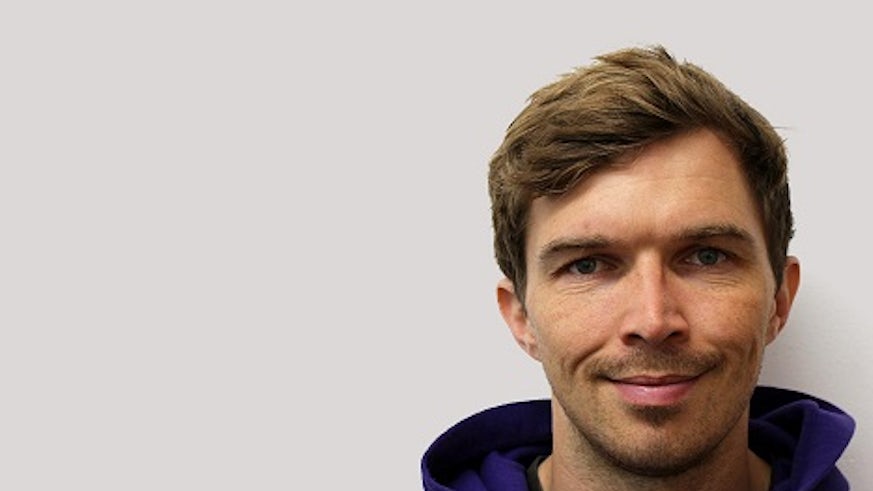Modelling catalysis for a greener future: Meet our UKRI Future Leaders Fellow
13 July 2023

Dr Andrew Logsdail, Senior Lecturer in Catalytic and Computational Chemistry, features in a new podcast series showcasing top UK researchers.
Tell us about your research.
My research is developing and applying computer models to describe the interactions between molecules and materials. With my great team, these models are applied in the field of catalysis with a core focus on creating renewable fuels to replace fossil fuels like petrol. Our work is fundamentally chemistry, but the team has expertise in physics, computer science, and materials science, as our research is very multidisciplinary.
UKRI (UK Research & Innovation) Future Leaders Fellowships (FLF) provide long-term funding to develop the next wave of world-class research leaders in academia and business. What was your Fellowship awarded for?
I was awarded a Future Leader Fellowship to build ambitious new multiscale methods for modelling catalysis, which will allow the study of chemical reactions with more accuracy and greater throughput than previously.
The project goal fits the Future Leader Fellowship scheme by addressing a long-term, ambitious and multi-disciplinary question, with our plan being to apply the outcomes to the design of catalysts for making renewable fuels, such as hydrogen and alcohols, from sustainable resources.
You recently featured in a FLF Development Network Next Generation Research podcast. Can you give us a heads-up of what's covered?
The podcast focuses on my project developing new modelling paradigms to accelerate catalyst discovery and to apply these methods to challenges in renewable and green chemistry. With Dr Jennifer Edwards and PhD student Naomi Lawes, I discuss how modelling allows atomic insight into chemical processes and allows for the testing and building of new catalysts without the risks of laboratory experimentation.
Jenny and Naomi talk about the impact of computational modelling on their work; for Jenny, this is making hydrogen peroxide for sanitation purposes on demand, whilst for Naomi this aims to convert carbon dioxide (CO2) into fuels.
I also lean into the conversation about future impact of the work and opportunities, which includes the integration of data-driven approaches into our modelling to accelerate discoveries further.
Listen to the FLF Next Generation Research podcast.
What do you hope to achieve from the Fellowship and what progress have you made so far?
With the Fellowship, I hope to make tangible impact on the way catalysis can be investigated via computational modelling. In particular, I want to provide capability for studying how external stimuli (such as temperature or pressure) can change the reaction chemistry. To provide accurate, time-resolved models of the reaction environment is really challenging, but a fantastic goal – it will create opportunities for the true digitisation of catalyst design.
I also hope to develop as a leader, and am building experience in this skill through participation in various leadership roles. The FLF has provided a great platform for my development, and I want to use this as a building block for more impactful leadership in the long-term.
Our research progress to date has included new modelling capabilities, but we’re still building to the key milestone of new multiscale approaches. Software development can be challenging and we're continuously building new capabilities, both in our software infrastructure and also developing people in the research team.
The FLF programme allows flexibility and has enabled us to engage in some great projects that weren’t originally envisioned, including with industrial partners such as BP and Johnson Matthey, which raises the potential impact of our work.
What does being a leader mean to you?
I subscribe to the common textbook definition of leadership, “influence without authority”. I believe leadership requires the ability to communicate a clear vision and objectives, to listen and speak when necessary and to support and motivate everyone. I aim to demonstrate leadership in my every day with leadership through example, via participation and actions. I think good leadership helps inspire others to be better versions of themselves.
What do you find most exciting about your work? What’s unique about it?
There are two aspects of my work that I find exciting. Firstly, the genuine potential to tackle globally important challenges, such as reducing greenhouse gas emissions, which can improve peoples’ quality of life.
Secondly, I love being able to talk with others about my work and motivate people with our findings. There is no purpose to our research unless we can share the learnings with colleagues, friends, family, and the public in a manner that inspires them too.
Our research is unique because it spans multiple research domains, coupling expertise in software design and high-performance computing with the knowledge of materials and reaction chemistry that underpins catalysis.
How did you get into this area?
I was very inspired by the capabilities of personal computers (PCs) in the late 1990s; I spent hours building computers and/or programming new software. I was also really stimulated by chemistry through some engaging teachers, and I enjoyed how chemistry doesn’t always conform to the principles of computing logic.
As I progressed through education, I was able to study computer science and chemistry jointly before specialising in computational chemistry. I am indebted to the support and freedom of my PhD supervisor, Professor Roy Johnston, who showed me the potential for using computers to interpret chemical data. His encouragement led to me building a career in computational chemistry.
In recent years, the focus of our research has been increasingly towards building a greener, more sustainable society, which is a really core area of strength in the Cardiff Catalysis Institute. The research involves making reactions more efficient, so they need less energy to work, as well as making the chemistry cleaner. Mitigating climate change and the potentially devastating impact on the global population are strong personal motivations for our endeavors.
